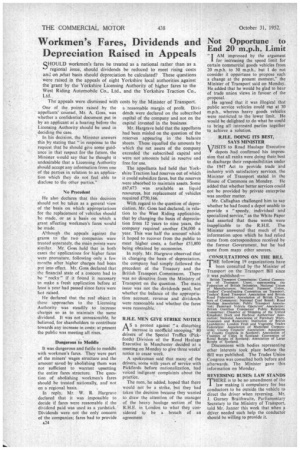Not Opportune to End 20 m.p.h. Limit
Page 26

If you've noticed an error in this article please click here to report it so we can fix it.
"I AM impressed by the argument for increasing the speed limit for certain commercial goods vehicles from 20 m.p.h. to 30 m.p.h., but I do not consider it opportune to propose such a change at the present moment," the Minister of Transport said on Monday. He added that he would be glad to hear of trade union views in favour of the proposal.
He agreed that it was illogical that public service vehicles could nap at 30 m.p.h., whereas heavy goods vehicles were restricted to the lower limit. He would be delighted to do what he could to bring all interested parties together to, achieve a solution.
R.H.E. DOING ITS BEST, SAYS MINISTER
VISITS to Road Haulage Executive depots had confirmed his impression that all ranks were doing their best to discharge their responsibilities under the 1947 Act to provide trade and industry with satisfactory services. the Minister of Transport stated in the House of Commons on Monday. He added that whether better services could not be provided by private enterprise was another matter.
Mr. Callaghan challenged him to say whether he had found a depot unable to provide a "speedy, individual and specialized service," as the White Paper had asserted that these words were inapplicable to the R.H.E. The Minister answered that much of the information upon which he had relied came from correspondence received by the former Government. but he had some from many other sources.
CONSULTATIONS ON THE BILL "THE following 19 organizations have I been consulted by the Minister of Transport on the Transport Bill since it was published:— British Transport COMmiSsiOn: Cellital Committee of Transport Users, representing the Federation of British Industries. National Union of Manufacturers. National Farmers' Union. Traders' Co-ordinating Committee on Transport. Traders' Road Transport Association and British Road Federation; Association of British Chambers of Commerce; NatiOnAi Coal Board; Road Haulage Association; Public Transport Association: Passenger Vehicle Operators' Association: British Omnibus Companies' Public Relations Committee; Chamber of Shipping of the United Kingdom: Dock and Harbour Authorities' Association; National Association of Furniture Warehousemen and Removers; Institution of British Launderers: London 'Fruit and Vegetable Trades Federation: Association of Municipal Corporations.: County Councils' Association; Association of County Councils In Scotland; Association of Counties of Cities In Scotland: Convention or Royal Burghs of Scotiami: Association of Large Burghs of Scotland.
Discussions with 'bodies representing other interests took place before the Bill was published. The Trades Union Congress was consulted both before and afterwards. The Minister gave this information on Monday.
REVERSING BUSES: LAW STANDS THERE is to be no amendment of the A law making it compulsory for bus conductors to be outside the vehicle to direct the driver when reversing. Mr. J. Gurney Braithwaite, Parliamentary Secretary to the Ministry of Transport, told Mr. Janner this week that when a Myer needed such help the conductor should be willing to provide it.












































































